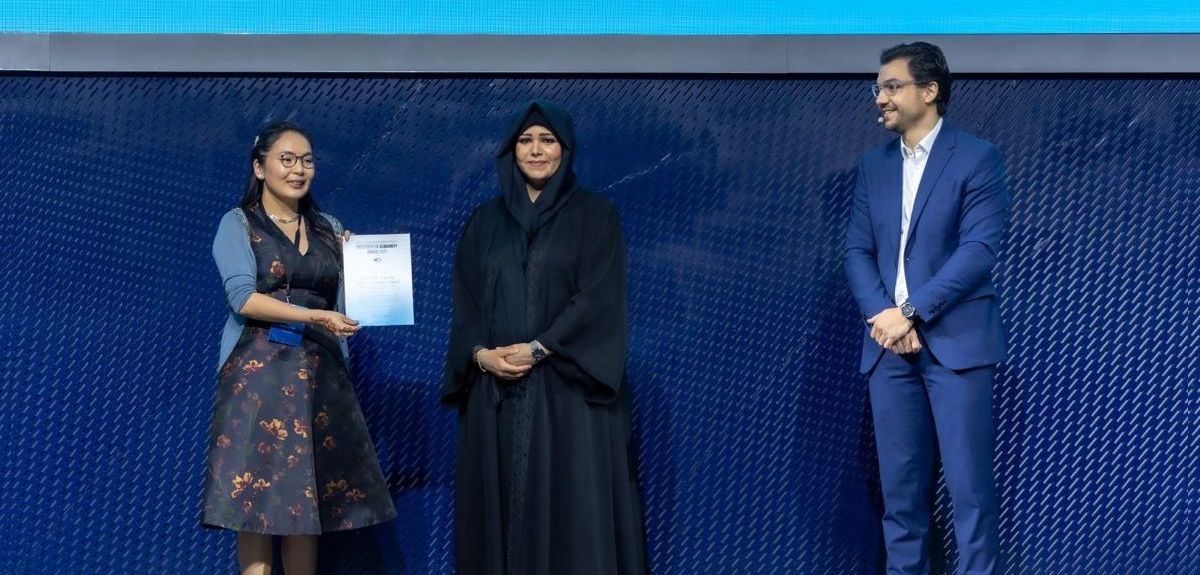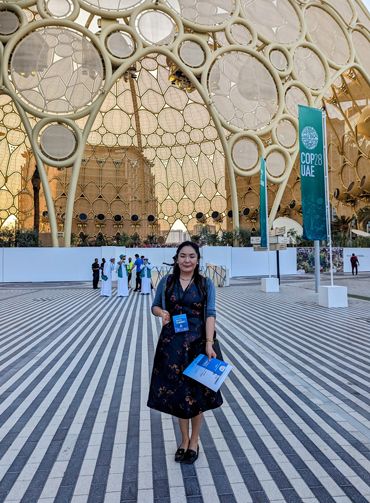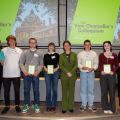
(c) Prototypes for Humanity
Oxford Engineering Student Wins Prototypes for Humanity innovation award at COP28
A project led by an Oxford Engineering DPhil student, Maral Bayaraa (Wadham, 2020), has won a prestigious Prototypes for Humanity Award - announced at the COP28 Climate Change Conference.
Chosen from over 3,000 entrants, the award-winning team also included Professor Brian Sheil, Laing O’Rourke Associate Professor at the University of Cambridge, who also holds a Visiting Fellowship at Oxford, and Dr Cristian Rossi, Associate Research Fellow at the UK Centre for Greening Finance & Investment (CGFI) and a visiting lecturer at Oxford's School of Geography and the Environment.
Prototypes for Humanity recognises innovators in science and engineering, working on solutions for social and environmental issues. Maral’s project, Digital Twins 4 Tailings Dams, is a satellite-based early warning system that can prevent disasters in mines. The project won in the category for Data science and AI-enabled solutions.
Globally, there are over 30,000 tailings storage facilities (TSFs), which contain toxic mining waste products. A quarter of these facilities are abandoned and unmonitored. By integrating geotechnical engineering, satellite remote sensing and machine learning, Digital Twins 4 Tailings Dams monitors these critical infrastructure facilities, providing an early alert for signs of catastrophic failure.
(c) Maral Bayaara Maral Bayaara at COP28
Maral Bayaara at COP28
Maral is a doctoral student at Oxford’s Department of Engineering Science, with an Industrial Fellowship from the 1851 Royal Commission. Her research is on developing a satellite-based early warning system for geotechnical structures. She is also a part-time Earth Observation Specialist at the Satellite Applications Catapult, the UK government-backed innovation and technology hub.
This award recognises the huge role that Earth Observation, our industry, plays in tackling some of today's biggest challenges. Earth Observing satellites can be likened to 'macro-scopes' drifting around the Earth. Just as microscopes provide insights on the tiny 'micro' scale and contribute to solving diseases, Earth Observing macro-scopes contribute to our understanding on a larger scale.
Maral Bayaara
Prototypes for Humanity
The Prototypes for Humanity Awards celebrate the next generation of innovators and their commitment to finding solutions for social and environmental issues. The 2023 award-winning innovations included synthetic yeast, an injection optimised for emergency disaster relief, invasive weeds transformed into eco-friendly plastics, satellite monitoring to prevent disasters, and AI to combat corruption.
Since 2017, each year prizes have been presented to outstanding participants from the showcase - academic innovators who use problem-solving to address challenges of global proportions. In 2023, $100,000 in prizes were presented to the students, and the lead professor behind each of the best solutions, to enable them to further develop their projects. The five awards categories reflect key COP28 themes:
- Nature, Food, and Water systems
- Health, Relief and Safety
- Energy, Efficiency and Waste
- Education, Equality and Communities
- Data science and AI-enabled solutions (across all above)
 Landmark study definitively shows that conservation actions are effective at halting and reversing biodiversity loss
Landmark study definitively shows that conservation actions are effective at halting and reversing biodiversity loss
 Researchers find oldest undisputed evidence of Earth’s magnetic field
Researchers find oldest undisputed evidence of Earth’s magnetic field
 Honorary degree recipients for 2024 announced
Honorary degree recipients for 2024 announced
 Vice-Chancellor's innovative cross-curricular programme celebrated
Vice-Chancellor's innovative cross-curricular programme celebrated
 New database sheds light on violence in Greek detention facilities
New database sheds light on violence in Greek detention facilities